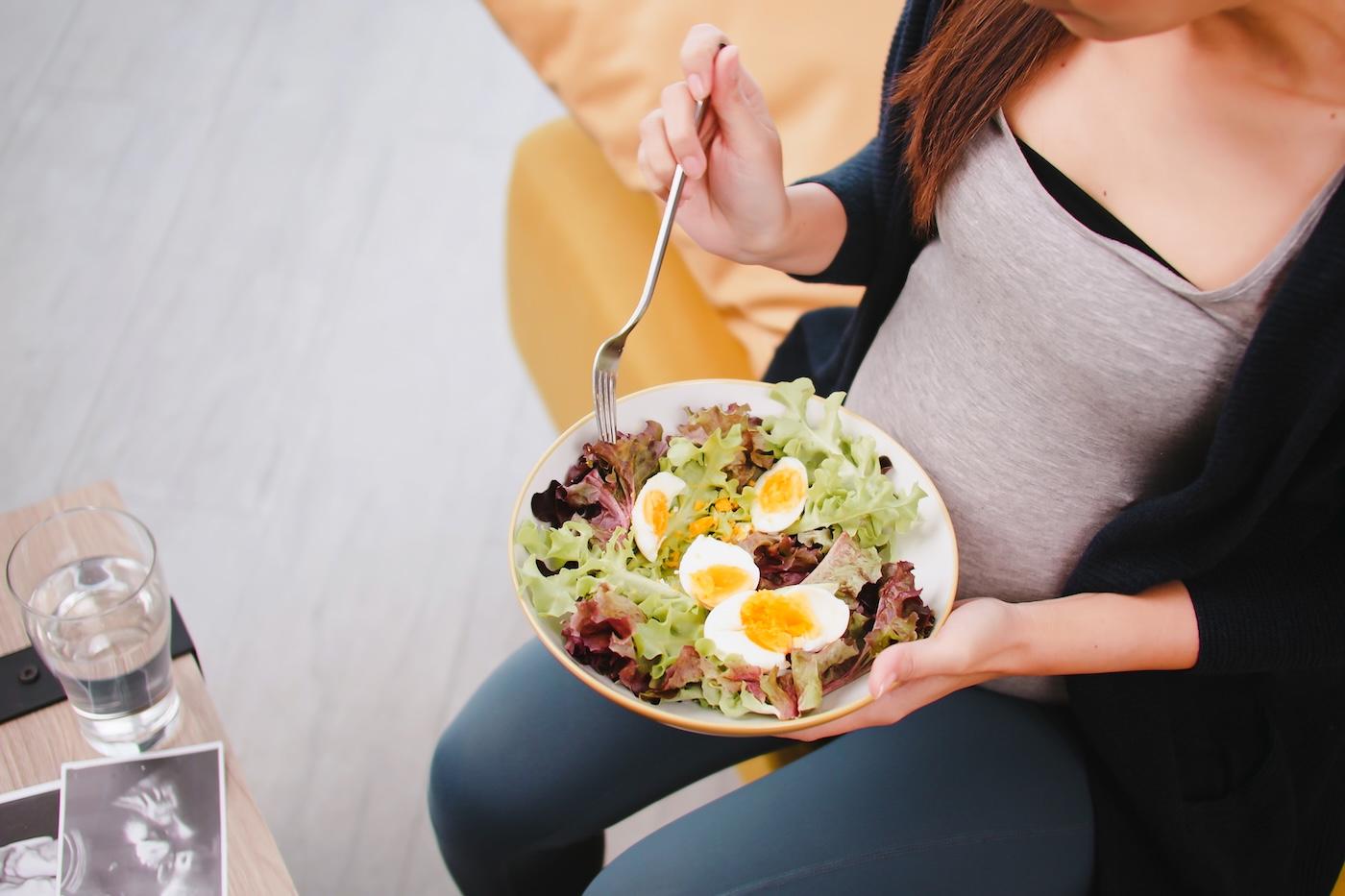PREGNANCY
The 6 Nutrients You Need When Pregnant
Eating right when you’re pregnant can be tough! (Um, morning sickness and weirdo cravings.) But getting proper nutrients to your growing baby is super-important. Here’s what you need.

Written by
Gabrielle McPherson, MS, RDN, LDN

Between the cravings and the morning sickness, figuring out the right foods to eat when you’re pregnant can be tricky. But we all know that good nutrition is key to knitting together a healthy baby in the womb…and preparing them for their postpartum debut. While many nutrients are vital for supporting your growing bump, some are a wee bit more critical than others. Give your little one the best start by peppering your pregnancy diet with these top nutrients.
Pregnancy Diet Must #1: Iron
Now that you’re pregnant, your body needs twice the amount of iron it did pre-pregnancy. Iron is a key mineral because it delivers oxygen and nutrients directly to your growing baby. And the iron your baby-to-be gets before they’re born continues to be important afterward. You see, babies store iron in their bodies and depend on it for their first six months. The problem? Iron deficiency in pregnancy is rampant, impacting one in two pregnancies. To help avoid iron deficiency—and to stack the safe-uncomplicated-pregnancy deck in your favor—it’s important to take a prenatal vitamin that contains iron and to eat a diet rich in this important mineral. Moms-to-be need 27 milligrams of iron every day. Here, foods to get you there:
- Fortified breakfast cereal: 1 cup (18 milligrams)
- White beans: 1 cup (8 milligrams)
- Lentils: 1 cup (7 milligrams)
- Flank steak: 3.5 ounces (6.7 milligrams)
- Dark chocolate: 3 ounces (6 milligrams)
- Fully cooked mussels: 3 ounces (5.7 milligrams)
- Cooked spinach: Half cup (3 milligrams)
- Cashews 18 nuts (2 milligrams)
For an iron-focused lunch, prep one cup of lentils with a half cup of cooked spinach (10 milligrams) and you’re already at 37% of your daily iron needs. For snack help, mix 3 ounces of dark chocolate with 18 cashews (8 milligrams) for 30% of your daily dose.
Did you know? It’s best to pair iron-filled eats with vitamin C-rich foods, like bell peppers or citrus fruits. Vitamin C works with iron to help your body absorb more of the mineral. Talk about teamwork!
Pregnancy Diet Must #2: Iodine
Iodine is a mineral with a couple of important jobs: To buoy thyroid health, which helps you use and store energy from food…and to bolster the development of Baby’s nervous system, including their brain, spinal cord, and nerves. And remember, if you don’t get enough iodine during pregnancy, your baby doesn’t either. While severe iodine deficiency is pretty rare in the United States, even a mild deficiency during pregnancy may still cause cognitive impairment in children. It’s best for pregnant folks to get 220 micrograms of iodine daily. But don’t expect your prenatal to always deliver the goods, since not all contain iodine. Some good sources of iodine include:
- Dried seaweed: 33 sheets (220 micrograms)
- Baked cod: 3 ounces (158 micrograms)
- Plain Greek yogurt: 1 cup (116 micrograms)
- Cow’s milk: 1 cup (85 micrograms)
- Iodized table salt: one-fourth teaspoon (76 micrograms)
Snacking on 33 dried seaweed sheets (220 milligrams) will give 100% of your daily value! Alternatively, sprinkle one-fourth teaspoon iodized table salt on 3 cups of olive oil drizzled air-popped popcorn (76 milligrams) and pair that with 1 cup of milk (85 milligrams) for 76% of your daily requirements.
Did you know? All iodized salt sold in the U.S. contains 45 micrograms of iodine per gram of salt. But sea salt usually contains less iodine than table salt.
Pregnancy Diet Must #3: Folate or folic acid
Folate is a top nutrient babies need—and they need it from the start. (Actually, it’s important even before the start!) When your baby is just beginning to develop, folate helps form what’s called the neural tube, which is what eventually becomes Baby’s brain and spinal cord. Having adequate folate before and during pregnancy helps to protect your little one from brain and spine birth defects, including spina bifida. (Folic acid, by the way, is the synthetic form of folate that’s found in fortified foods and prenatal vitamins.) If all women took 400 micrograms of folic acid daily at least one month before getting pregnant and during early pregnancy, it could help prevent up to 70% of neural tube defects, according to the March of Dimes. (That need bumps up to 600 micrograms a day as pregnancy progresses.) To make sure you’re getting enough, take your prenatal vitamins and seek out healthy foods that are rich in this key nutrient, such as:
- Fortified breakfast cereal: 1 cup (189 micrograms)
- Cooked asparagus: Half cup (134 micrograms)
- Kidney beans: 1 cup (131 micrograms)
- Enriched white rice: 1 cup (108 micrograms)
- Cooked beets: Half cup (68 micrograms)
- Orange juice: 1 cup (40 micrograms)
For breakfast, consider enjoying one cup of fortified breakfast cereal (189 micrograms) with milk and one cup of orange juice (40 micrograms) for 38% of your daily value of folate. As a side to your favorite protein-rich entree, try a half cup each of sautéed asparagus (134 micrograms) and sautéed beets (68 micrograms) for 34% of your daily needs.
Did you know? If you take a folic acid supplement with food, your body is able to use about 85% of the nutrient. But when you take it without food, nearly 100% of supplemental folic acid is bioavailable.
Pregnancy Diet Must #4: Calcium
From the get-go, growing a baby requires calcium—and lots of it. Baby-to-be needs calcium to build strong bones, teeth, and muscles. And moms-to-be need this key pregnancy nutrient to help keep blood pressure in check, which can help prevent preeclampsia, which reduces blood flow to the placenta. Pregnant individuals over the age of 19 need 1,000 milligrams of calcium daily. You can get the proper amount by taking prenatal vitamins and eating foods that are good sources of calcium, including:
- Plain yogurt: 1 cup (448 milligrams)
- Fortified orange juice: 1 cup (349 milligrams)
- Fortified soymilk: 1 cup (299 milligrams)
- Firm tofu: Half cup (253 milligrams)
- Canned sardines: 3 ounces (200 milligrams)
- Cooked edamame: Half cup (131 milligrams)
Combine one cup of plain yogurt (448 milligrams) with a half cup of banana slices for a calcium-boosted breakfast that offers up almost half of your daily calcium needs. When you’re looking to snack, reach for a half cup of cooked edamame (131 milligrams) and one cup of fortified orange juice (349 milligrams) for 48% of your daily calcium requirements.
Did you know? Prenatal vitamins are meant to supplement your calcium intake, not be your calcium intake! If you rely solely on prenatals to meet your calcium needs, you won't get enough.
Pregnancy Diet Must #5: Omega 3-fatty acids
One omega-3 in particular is a super-important pregnancy nutrient: Docosahexaenoic acid (DHA). This healthy fat is only found in foods and supplements. That means, your body simply cannot make it alone. DHA is absolutely critical for your little one’s growth and development…especially when it comes to your baby’s brain and eyes. While baby’s in progress, you’ll benefit from 1.4 grams of omega-3 fats daily, including DHA. And since not all prenatal vitamins contain DHA, you’ll have to look for food sources, too, like fish. Despite what you may think, fish can be very safe in pregnancy—and important, too. Simply limit intake to 8 to 12 ounces a week of low mercury fish. Here’s some more guidance:
- Cooked salmon: 3 ounces (1.24 grams)
- Canned sardines: 3 ounces (0.74 grams)
- Canned, light tuna: 3 ounces (0.17 grams)
- Cooked egg: 1 egg (0.03 grams)
If you top your arugula and blueberry salad with 3 ounces of cooked salmon (1.24 grams), you’ll enjoy 88% of your daily value of omega-3 fats.
Did you know? If you suspect you’re running low on DHA, consider asking your healthcare provider for a screening. Recent research found that pregnant individuals who took 1,000 milligrams of DHA daily in the last half of pregnancy had a lower rate of preterm birth than women who took the standard 200 milligram dose.
Pregnancy Diet Must #6: Protein
Protein is a powerful pregnancy nutrient that’s considered a basic building block for baby’s growth. It drives the creation, structure, and function of your growing baby’s cells, hair, skin, tiny fingernails, and much more! When it comes to protein, the general rule of thumb is this: At minimum, pregnant women should eat 60 grams of protein daily. That said, some experts believe that the minimum threshold should be higher. In the end, you and your bub-to-be likely need to take in 70 to about 100 grams of protein a day, depending on your weight and trimester Talk to your OB/GYN or midwife about your specific needs and look for these protein sources:
- Chicken breast: 3 ounce (26 grams)
- Ground beef: 3 ounces (21 grams)
- Cottage cheese: Half cup (14 grams)
- Black beans: Half cup (7 grams)
- Almond butter: 2 tablespoons (7 grams)
- Cooked egg: 1 egg (6 grams)
For a protein-packed breakfast, try two scrambled eggs (12 grams), freshly chopped mango, and a half cup of cottage cheese (14 grams) for 43% of your daily protein needs. For lunch, make a single serving high-protein taco with 3 ounces of cooked ground beef (21 grams) and a quarter cup black beans (3.5 grams) for 41% of your daily protein requirements.
Did you know? Your body best absorbs and utilizes protein when it’s spread out over the course of the whole day—not all eaten at dinner!
For more expert pregnancy nutrition advice from Gabrielle McPherson, MS, RDN, LDN, check these stories out:
Low-Carb Pregnancy Snacks for Gestational Diabetes
The Pregnancy Deficiency You Need to Know About
Ease Morning Sickness—Naturally
Is Eating Fish During Pregnancy Safe?
Disclaimer: The information on our site is NOT medical advice for any specific person or condition. It is only meant as general information. If you have any medical questions and concerns about your child or yourself, please contact your health provider.
SHARE THIS ARTICLE
MOST LOVED
Sleepytime Sidekicks
More on Pregnancy
About Gabrielle McPherson, MS, RDN, LDN
Gabrielle McPherson, MS, RDN, LDN is registered dietitian in Missouri who specializes in community and pediatric nutrition. Gaby is passionate about encouraging families to eat well in simple, practical ways that are realistic...and delicious! When not working, Gaby loves cooking, baking, and making messes and memories with her sous-chef/preschooler Charlotte.












